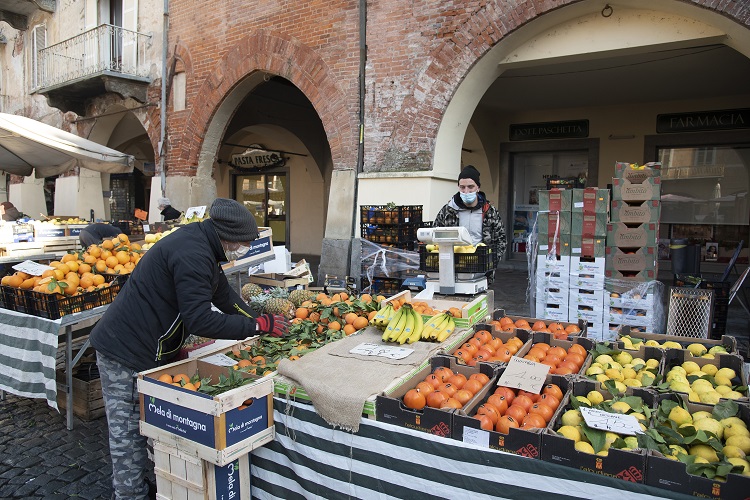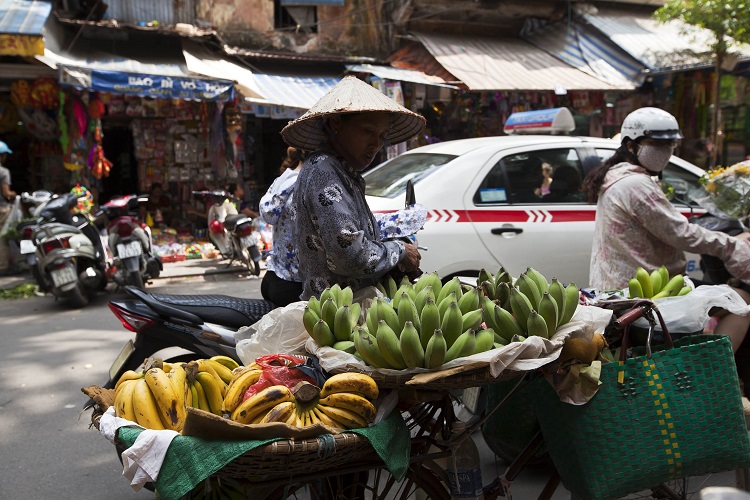Launch of two global city-to-city networks on Food Governance and Urban Food Markets

FAO and Rikolto are joining forces to set up two networks to increase policymakers’ awareness and capacity on urban food systems governance and food markets, so they can contribute to more sustainable food systems.
With global food consumption, markets, and decision-making centres concentrated in urban areas, cities have a fundamental role to play in steering the transformation towards more sustainable food systems. At the same time, food systems are governed by complex interactions, power relations and governance structures, making it difficult for cities to identify the right entry points for action at their level. Building networks is an important lever to enable cities who have gone through similar challenges and reflections to exchange among themselves and learn from each other.
Launched at the beginning of 2022, the 2 networks are reaching almost 40 cities from 4 continents exchanging in 3 languages: French, English and Spanish. The networks contribute to FAO’s Urban Food Agenda, a flagship initiative to enhance sustainable development, food security and nutrition on the rural-urban continuum from a multi-level governance perspective. These will also be an important component of the FAO's strategy to achieve sustinable food systems, as foreseen in the new FAO Strategic Framework for the next 10 years.
The Network on Urban Food Governance for Small and Intermediary Cities
Multistakeholder food governance mechanisms (such as food policy councils or food labs) are increasingly emerging as critical instruments to address gaps in local policies and planning related to food. While examples of food governance have been relatively well documented in metropolitan cities, the support and guidance provided to small and intermediary cities is often lacking.
To help bridge the gap, FAO, with the support of Rikolto initiated the Network on Urban Food Governance for Small and Intermediary Cities, a space where cities can inspire each other, learn and gain confidence to start and/or continue their food governance journey.
“Small and intermediary cities have strong linkages with agriculture and rural areas and can act as regional market centres or hubs, offering innovative employment opportunities. They can connect traders and producers with customers and markets in larger metropolitan areas” said Jamie Morrison, Director of the Food Systems and Food Safety Division of FAO during the launch event of the network on April 4.
According to him, it is fundamental for FAO to keep engaging with cities in order to achieve meaningful food systems transformation. “But this new magical world won’t come automatically. Governance actions are fundamental”.
This new network involves over 25 small and intermediary cities from Latin America, Africa and Southeast Asia with participants joining from Argentina, Colombia, Ecuador, Peru, Brazil, Guatemala, Chile, DRC, Senegal, Morocco, Burkina Faso, Uganda, Kenya, Tanzania, Zambia, Ghana, Indonesia, and the Philippines. Five exchanges are planned in 2022: 2 in the plenary group and 3 in regional groups, focusing on multi-stakeholder dynamics for city food governance, urban food planning, and food strategies and policies.
“Alliances of local governments of small and intermediary cities can play a key role in identifying and coordinating actions and investments that will contribute to food systems transformation. It is also critical to ensure that the processes are inclusive and participatory.” - Jamie Morrison, Director of the Food Systems and Food Safety Division of FAO.
The Technical Network of Municipal Experts on Urban Food Markets

Several studies have shown that unhealthy dietary patterns can be linked to purchasing food from specific outlets. Urban markets are therefore an important entry point to support the adoption of healthy diets since they have the potential to improve the accessibility, availability, and affordability of diverse, locally produced, seasonal, healthy and nutritious food.
The Technical Network of Municipal Experts on Urban Food Markets was therefore created to offer a space where municipal experts and other stakeholders can share their experiences and generate new ideas on how to improve the sustainability and inclusivity of local food markets in their municipality.
It was formally launched on March 29 during a plenary session co-hosted by FAO and Rikolto with the participation of the World Union of Wholesale Markets. The network involves over 20 intermediary and metropolitan cities from Latin America and Africa, with participants from Guatemala, Honduras, Peru, Ecuador, Colombia, Morocco, Tunisia, Senegal, Burkina Faso, Tanzania, Uganda, Kenya, Rwanda and DRC. The cities of Montpellier (France), Valencia (Spain) and Leuven (Belgium) will join them at various moments of the exchanges to bring in insights from their own experiences on the ground.
“Many local authorities often lack the capacities, resources and perhaps good enough reason to invest extra energy and precious resources for unlocking the potential of local food markets […]. Yet, investing in local markets goes beyond investing in food security and nutrition. It also means investing in public health, local economy, cultural identity and the quality of public space.” Florence Tartanac, Senior Officer, Food and Nutrition Division, FAO.
Bilateral interviews, group discussions and written feedback have been collected to develop an agenda tailored to the needs and experiences of the participants. Seven exchanges are planned for 2022: 2 plenary sessions with the entire group of cities and 5 per regional group. While the content of the discussions will vary depending on the interests of the participants in each group, the following questions will likely feature high on the agenda: Which mechanisms can be put in place to include smallholder food producers into neighbourhood and wet markets? Which business models can help make food distribution and logistics more efficient to increase the affordability of fresh local foods? What mechanisms and models can encourage circular food initiatives to reduce food loss and waste in markets? And how can food strategies and food councils influence the way markets are managed and support the emergence of new initiatives?
“The launch events of the 2 networks served multiple purposes: to develop a mutual understanding of how urban markets and food governance can contribute to healthy and sustainable diets, to understand the needs and expectations of participants so that the content of the exchanges could be tailored to their needs, to map the experiences that each city will be sharing with the rest of the group, and to create ownership of the network and its objectives among participants” says Charlotte Flechet, Food Smart Cities Programme Director, Rikolto.

